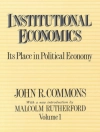Many tools are on offer to politicians and other policy-makers when they seek to change policy outcomes. Often they choose to concentrate on one set of tools, but fail to see the costs as well as the benefits – and may not consider the available evidence regarding their effectiveness. This innovative new textbook clearly sets out the main tools of government, and provides an analysis of their efficacy when applied to public problems.
Each chapter examines the relative benefits and costs of using a key tool that is available to improve policy outcomes, drawing on a diverse literature, a large number of empirical studies and a range of contexts. Areas covered include:
- governments and policy outcomes
- law and regulation
- public spending and taxation
- bureaucracy and public management
- institutions
- information, persuasion and deliberation
- networks and governance.
Offering a clear and comprehensive evaluation, and highlighting the set of powerful tools commonly available, this text encourages students to consider the most effective combination in order to manage key issues successfully. Including a useful glossary of key terms, this book will be of great interest to all students of public policy, administration and management.












